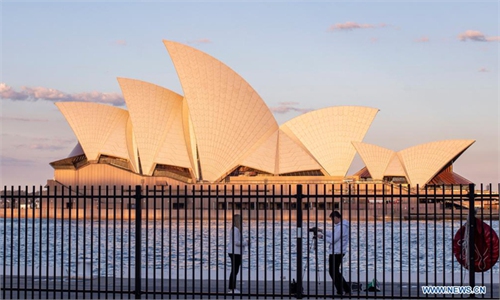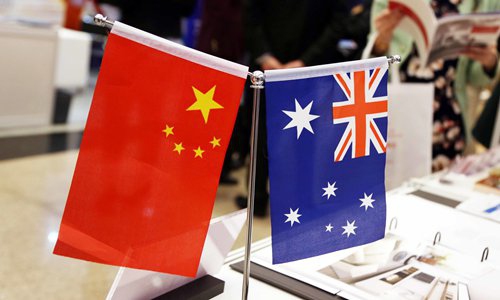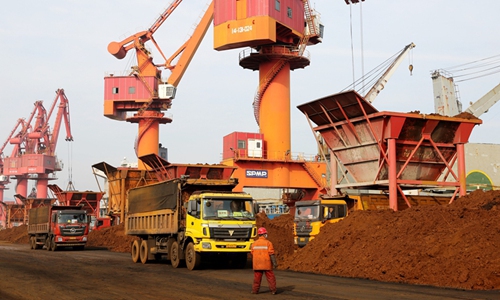Australian Treasurer Josh Frydenberg's war-cry of decoupling from China economically unwise, strategically erratic

Australian Treasurer Josh Frydenberg. Photo: AFP
Australia's Treasurer Josh Frydenberg recently made a keynote address at Australian National University that is fraught with misidentifications and miscalculations. Frydenberg was parroting US Secretary of State Anthony Blinken by saying that Australia is engaged in a strategic competition with China. Frydenberg is very much deluded in thinking that as Washington's close ally, Australia could aspire to enjoy the same strategic weight.Nothing is more detached from today's international geopolitical reality than such illusory overconfidence. Geopolitically, economically, and culturally, Australia has never been, and will never be, in a position to qualify as China's competitor.
There is an even more bizarre statement in the Australian Treasurer's bloviated speech. In spite of the strong economic headwinds resulting from the current Delta variant outbreaks across the country and the ensuing lockdowns that are taking place in almost all states, Frydenberg inexplicably claims Australia's economy has performed better, much to the surprise of serious minded observers. He said this in spite of the fact that a mammoth proportion of Australian exports to China has been going downhill, while tourism and education are completely stalled due to international travel restrictions.
Westpac's recent analysis lowered Australia's economic growth forecast for 2021 from 2.4 percent to 0 percent. A mid-August report released by the University of Adelaide's Institute for International Trade warned Australia to brace for a potential economic impact of A$ 23 billion ($17 billion) against the harrowing background of the deteriorating China Australia trade relations. However, turning a blind eye to such a dire situation, Australia's top cabinet minister unabashedly gloated in his speech saying that "our economy has continued to perform very strongly."
Frydenberg tried to advertise his "China plus" strategy in his speech. However, a close look into the text unambiguously unveils his true message. The so-called "China plus" strategy is in essence "China minus." Frydenberg is purposely trying to dictate Australian businesses to redesign themselves. He is deceiving the business community that Australia's economy can survive and sustain its growth without trading with China. This is an irrational war-cry for substantive decoupling. This shows Canberra's determination to position China as an adversary, not a partner.
The close attachment of Australia's economy to China's economic development has been beneficial to both countries. Australia's export-oriented economy mainly involves agricultural and animal husbandry products, international tourism and education, and energy and mineral products, which China always has a sustaining appetite.
With Canberra continued political hostilities toward China, we are witnessing a significant dwindling of positive impressions and opinions among Chinese businesspeople, investors, and consumers toward Australia. This is reflected in the recent setbacks in the imports from Australia to China.
Australia's media coverage of China and the negative opinions of Canberra's political figures have been deterring Chinese enthusiasm to choose Australia as a destination for business initiatives, holiday making and education when the pandemic restrictions ease in the future. What's more, the discriminatory regulations and policies on Chinese mergers and acquisitions have led to a sharp decline of investments from China.
The ongoing Delta variant outbreaks in various parts of Australia have led to an increase of the federal government and other public expenditures. Stimulus packages have been made available to sectors of the Australian economy. These have been stirring economic activities and pushing up housing prices. However, anyone with the commonsense of modern economics would point out that the short-term skin-deep economic incentives are not conducive to long-term sustainable development.
There have been no new trade disputes between China and Australia. Frydenberg's latest unprovoked war-cry of a trade severance with China is therefore logically odd, economically unwise, and strategically erratic.
Australia's reliance on the China market far outweighs Chinese consumers' fondness of Australian wines, lobsters, and so on. As a matter of fact, China is now more than ever losing serious interest in playing along with Canberra's constant immature game of megaphone diplomacy.
It seems the Morrison administration will continue to stick with its hostile approaches in handling Australia's relations with China. It takes no crystal ball to foresee that Canberra will have to pay for such madness and arrogance.
The author is president of the Chinese Association of Australian Studies, and professor and director of Australian Studies Centre, East China Normal University. opinion@globaltimes.com.cn



